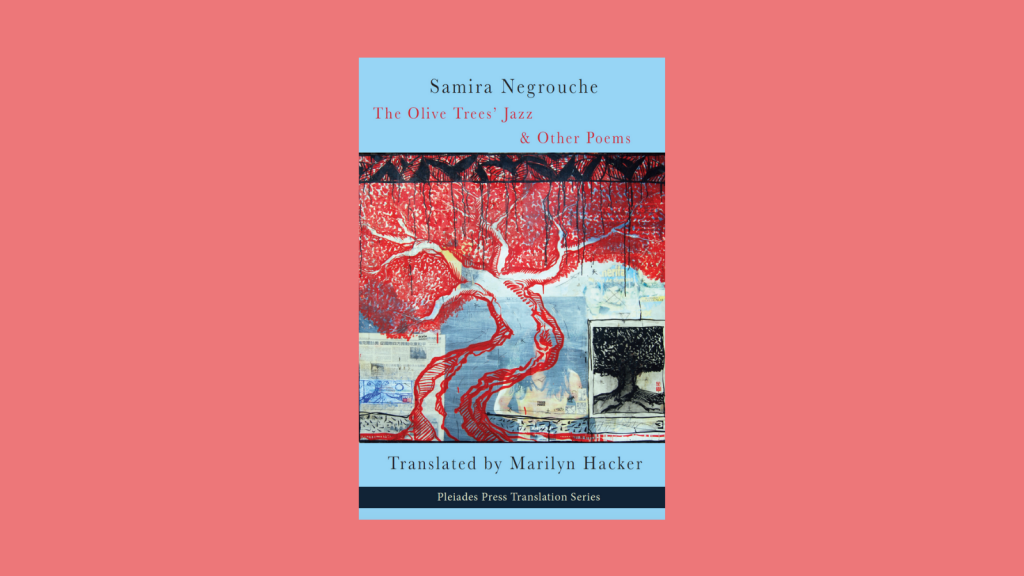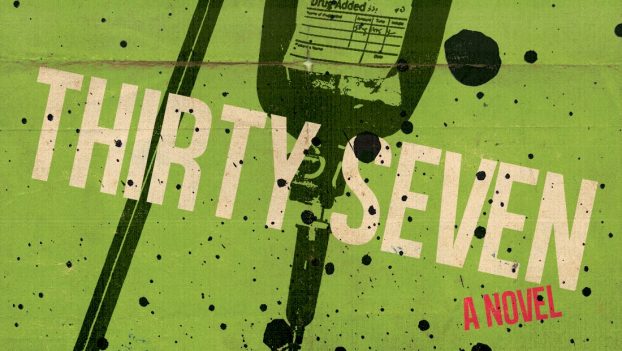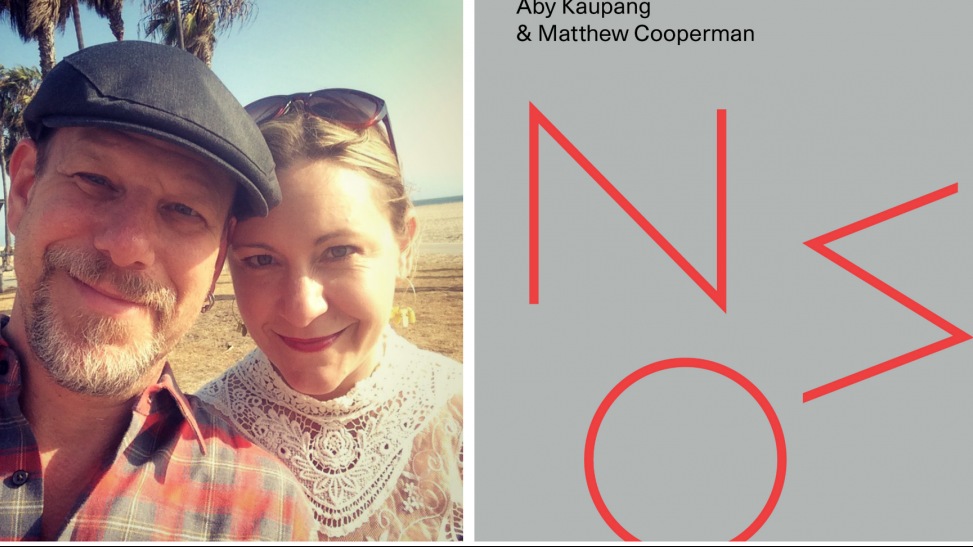In Samira Negrouche’s poem “Zigzag knots,” the internal conceit, the speaker’s musings while looking at a window frame, is dotted with surrealist directives and abstractions that tint the narrative in striking ways. Take, for example, the last stanza of the poem which reads,
Fenêtre du dedans : relief hâte-toi l’ami d’apporter ta mesure ici est né un chant pour ceux qui se souviennent ici est né l’oubli de ceux qui abordent de ceux qui reviennent par des portes inconnues des sentier non conquis presse-toi étranger la vague est atteinte ici est la mesure on y entre par la mer. ¤ Indoor window: in depth hurry, friend bring your measure a song is born here for those who remember here the ones who dock beside you are forgotten the ones who return by unknown doors unmastered pathways hurry, stranger the wave was mounted here is the measure you enter by sea
In complement to the highly metaphysical nature of the poem, the last stanza acts, on the surface, as an invitation to “measure.” We might gloss the meaning of the word measure, in this context, from three lines earlier in the poem: “the old oak goes on/syncopating monologues/of the shipwrecked” (the old oak, here, refers to the material which the literal window frame is made of and what is called upon to be measured). The lyrical scope of the window is one that extends past the “oak” and considers the histories and lives, the “monologues,” of the oak’s other forms. When the addressed is asked to measure, it is indeed a measurement of the surface, the interior of the window, but it is also one that demands measurement of an exterior. The “monologues,” the “unknown doors,” and “unmastered pathways” by which the oak has ended up here and has found itself center of the speaker’s lyrical musings. What is at the forefront and beyond, what is now and what has always been, the reality and the stories in-between, demands “song” as a unifier, as a means to travel between these spaces.
The Olive Trees’ Jazz and Other Poems by Samira Negrouche, translated by Marilyn Hacker, is just that: a collected group of poems that, through its high musicality and lyric, transcends mechanisms of division to give birth to such a song, one that is distinct in its Francophone Algerian heritage. The poems span cadences and voices that find commune in the region of Maghreb, to ones that challenge empire while wielding French as a primary weapon of protest, to others that are steeped with unfearing and unabashed love. The underlying strength in the collection is Negrouche’s ability to bend lyric into a song that considers, as it does in “Zigzag knots,” the traveling mind – a mind that ebbs out and flows back under a lyric refraction that populates the page. Hacker’s crisp and well-wrought translation preserves the musicality of the original syntax and the surprises of Negrouche’s mysterious, yet haunting, lyricism that makes possible such transcensions.
The sectioned prose poem in the collection, “Seven Little Jasmine Monologues,” each, in the translation, borrowing its title from capital cities (half of which are of the Maghrebin) in Africa and the Middle East, is a perfect example of Negrouche’s syntactic and lyrical sensibility. Set during the Arab Spring, the speaker(s) travels through limns of cityscapes that capture the sameness and universality of the language of protest. Take, for instance, this moment in the poem entitled “D.” or, in Hacker’s translation, “Damascus,”
Saint homme en tes terres les âmes ont quitté l’ombre du mur et jailli comme Un on a arrêté leurs ombres croissantes et elles sont restées Un on a brisé leurs cils et étouffé leurs regards elles sont restées Un. L’Un qui persiste et avance et parle enfin et divulgue l’imposture. ¤ Holy man in your land souls left the walls shadow and surged up as One their burgeoning shadows were arrested and they remained One their eyelashes were broken their gaze smothered and the remained One. The One who persists and comes forward and finally speaks and reveals the deception.
One of the more overt features of the prose, and in fact most of the poems in the collection, is a syntax that resists parataxis. Likely, Hacker’s choice to include “Damascus” in the translation is due to contextual reasons, but it’s at least worth the exercise of comparing the body of the prose under the original heading as if it were an abbreviated initial. Part of the success of this type of lyric amalgamation, then, is the blurring between person and land, nation, and conflict. The exclusion of the comma after “Holy man” creates possible two readings: the vocative wherein it is the Holy man being addressed or the Holy man as nominative, as an occupation of the land – both of which lead to very different understandings of “your.” The title leans toward the first reading where man is a stand-in for the land and people of Syria – but if read as addressing a singular person, remarkably, the scales of intimacy remain intact.
“Your” is at once local and collected suffering – a collected violence not only shared in Syria but one which is shared across Arab nations and regions. The “window” is shut, the monologues of the people, the individual, and the past are ignored, and in so doing, the once deified and ancient holy lands are reduced to “firing ranges.” In the speaker’s own words, “freedom is a chiseled symphony.” Negrouche’s lyricism mirrors this symphony, and the translation preserves the “chiseled” nature of the syntax, which invites, in this instance, the poem itself to become a reserved language of protest.
The inherent danger of speaking in the language of the colonizer is that the self can slip into “stranger,” as the opening poem, “Who is speaking,” suggests when the speaker says, “Who are you? When speaking in someone else’s language?” For Negrouche, language, and, subsequently, the lyric becomes a tool for this type of mental locomotion, but it is one that sometimes necessitates a guide for return.
In the poem “Gida,” the speaker, now in Europe, begins with an observation, “A Taverna Slavia/une ombre/le tramway qui glisse/sur un plan évanescent; At Taverna Slavia/a shadow/the streetcar slides/across an evanescent backdrop.” In another example of syntactic confusion, the shadow is either created by the streetcar, is the object by which the streetcar moves, or it modifies the streetcar’s movements (as if it were a shadow). What is clear, however, is that the reader is asked explicitly, through this confusion, to think through the plurality of image: the consequences of language and such movement.
The importance of this becomes apparent a couple of lines down, “de ses arbres noyés dans le Taksebt/perdus dans une filiation/qui ne sait pas/sa romance; from her trees drowned in Taksbet dam/lost in filiation/that doesn’t know/her ballad.” The literary critic Helen Vendler wrote, “the lyric remains the genre that directs its mimesis toward the performance of the mind in solitary speech.” The solitary speech here, however, is one of a polyglottal speaker writing in French against the French. Implicit in “filiation” is separation; separation from home, from an internal “ballad,” from a sense of song, all with gendered overtones to such ostracization. What the lyric represents is a way in which the speaker can transverse the language and culture of the transgressor and the transgressed, as both a mental and physical movement of mind. When the speaker ends the poem by saying: “J’ouvre mon corps/ à ce qui me rappelle/le jazz des oliviers.; I open my body/to what calls me back/the olive trees jazz” we know to read “jazz,” or lyricism more broadly, as not only a song of return and balance, but as a literal embodiment of such movement.
The song is further codified in moments that more overtly consider the language in the face otherness due to colonialization, “Je suis seul dans la négritude de mes poches et le vert trop vert de mon passeport; I’m alone in the negritude of my pockets and the much too green of my passport.” From moments of hopelessness, “Mes mots sont/tambour futile/au tempo d’une autre; My words are/futile drumming/to someone else’s beat” to piercing insights on love, “il n’y a d’amour que le doute qui grandit et se repose dans les certitudes du passé; there is no love but doubt that grows and rests in the certitudes of the past.” But more importantly, it is this song that imbues life within the speaker, as in the poem “Six makeshift trees around my bathtub”:
elle ne renferme aucun secret qui se traduise en termes sonores elle n’est la transposition virtuelle d’aucun narcissisme à peine un songe un aménagement géographique de ce qu’on appelle vie ¤ it holds no secret that can be translated to sound it is not the virtual transposition of any narcissism barely a dream a geographical arrangement of what we call life
To an English reader reading in English, The Olive Trees Jazz is a double encounter of lyric; we have the translators encounter to the original French, and we have the speaker’s own mimetic encounters and refractions of language. But what Hacker’s translation has managed to create is a lyrical mode that is choreographed to much the same song. It is a lyricism that illuminates birth, a birth of travel (both mental and physical), a birth of protest, connectivity, and love. It is a lyricism that, like the sea, extends outward then back in, washing back with it new observations, new artifacts, new life. As Negrouche’s speaker puts it, “je laisse la marée apporter son refrain; I let the tide bring its own refrain.”




